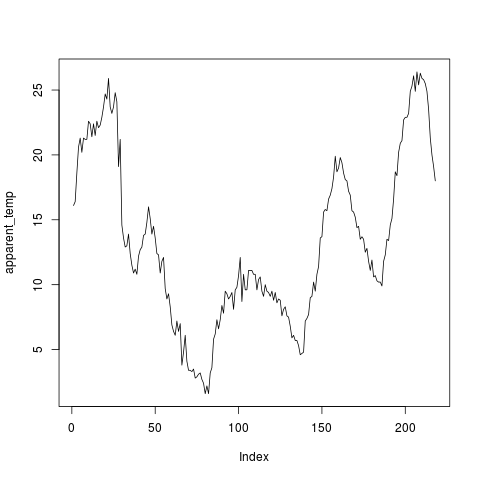Excess Heat Indices
Table of Contents
1 auto-download-bureau-meteorology-diurnal-data
- We;re looking at health impacts of high temperatures at work
- need to see the highest temperatures during the working hours
- bom provides hourly data for download, but only 3 days at a time
- we build a script and set it on a schedule to run every day, download the data and collate the results
1.1 First the FTP server URL structure
- The URLS are predictable, just need the station id, state and a code if metro or rural
1.2 table
| StationID | State | City9orregional8_ |
| 94774 | N | 9 |
| 95719 | N | 8 |
| 94768 | N | 9 |
| 94763 | N | 9 |
| 94767 | N | 9 |
| 94910 | N | 8 |
| 94929 | N | 8 |
| 95896 | N | 8 |
| 94693 | N | 8 |
| 94691 | N | 8 |
| 95677 | S | 9 |
| 94675 | S | 9 |
| 94672 | S | 9 |
| 94866 | V | 9 |
| 95867 | V | 9 |
| 94868 | V | 9 |
| 94875 | V | 8 |
- now create a script called "bomdownload.r"
- it takes the station details and paste into the URLs
- downloads the files
- stores in a directory for each days downloads
1.3 R Code: bomdownload.r
filename = "~/data/ExcessHeatIndices/inst/doc/weather_stations.csv" output_directory = "~/bom-downloads" setwd(output_directory) urls <- read.csv(filename) urls_list <- paste(sep = "", "http://www.bom.gov.au/fwo/ID", urls$State, "60", urls$City_9_or_regional_8_, "01/ID", urls$State, "60", urls$City_9_or_regional_8_, "01.", urls$Station_ID, ".axf") output_directory <- file.path(output_directory,Sys.Date()) dir.create(output_directory) for(url in urls_list) { output_file <- file.path(output_directory,basename(url)) download.file(url, output_file, mode = "wb") } print("SUCCESS")
- Now the data can be combined
- clean up the header and extraneous extra line at the bottom
1.4 R Code: bomcollation.r
# this takes data in directories from bom_download.r # first get list of directories filelist <- dir(pattern = "axf", recursive = T) filelist # next get directories for days we haven't done yet if(file.exists("complete_dataset.csv")) { complete_data <- read.csv("complete_dataset.csv", stringsAsFactors = F) #str(complete_data) last_collated <- max(as.Date(complete_data$date_downloaded)) #max(complete_data$local_hrmin) days_downloaded <- dirname(filelist) filelist <- filelist[which(as.Date(days_downloaded) > as.Date(last_collated))] } # for these collate them into the complete file for(f in filelist) { #f <- filelist[2] print(f) fin <- read.csv(f, colClasses = c("local_date_time_full.80." = "character"), stringsAsFactors = F, skip = 19) fin <- fin[1:(nrow(fin) - 1),] fin$date_downloaded <- dirname(f) fin$local_year <- substr(fin$local_date_time_full.80., 1, 4) fin$local_month <- substr(fin$local_date_time_full.80., 5, 6) fin$local_day <- substr(fin$local_date_time_full.80., 7, 8) fin$local_hrmin <- substr(fin$local_date_time_full.80., 9, 12) fin$local_date <- paste(fin$local_year, fin$local_month, fin$local_day, sep = "-") if(file.exists("complete_dataset.csv")) { write.table(fin, "complete_dataset.csv", row.names = F, sep = ",", append = T, col.names = F) } else { write.table(fin, "complete_dataset.csv", row.names = F, sep = ",") } }
- so now let;s automate the process
- make a BAT file
1.5 BAT file (windoze)
"C:\Program Files\R\R-2.15.2\bin\Rscript.exe" "~\bom-downloads\bom_download.r"
- add this bat file to the scheduled tasks in your control panel
- use chron for a linux version
1.6 check the data
#### name:check the data #### require(plyr) setwd("~/bom-downloads") source("bom_download.r") dir() source("bom_collation.r") complete_data <- read.csv("complete_dataset.csv", stringsAsFactors = F) str(complete_data) # Quick and dirty de-duplication table(complete_data$name.80.) qc <- subset(complete_data, name.80. == "Broken Hill Airport") qc <- ddply(qc, "local_date_time_full.80.", summarise, apparent_temp = mean(apparent_t)) names(qc) png("qc-diurnal-plot.png") with(qc, plot(apparent_temp, type= "l") ) dev.off()

1.7 Conclusions
- watch the data roll on in
- each day there are about 3 days downloaded
- meaning duplicates will be frequent, need to write a script to de-duplicate
- cheers!
</html>





